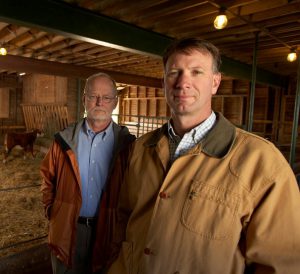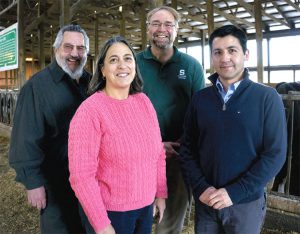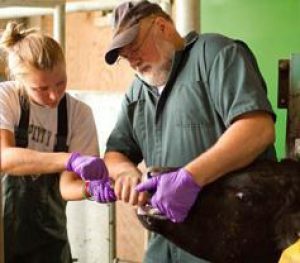The bill accounts for nearly $1 trillion and sets agricultural and nutrition policy for the next five years.

The Agriculture Act of 2014 authorizes a broad range of programs affecting what food is produced, how it is grown, packaged, and sold, and how low-income families pay for their food.
The bill authorizes a number of veterinary research and food-safety programs that the American Veterinary Medicine Association (AVMA) calls "vitally import for animal health and welfare." The AVMA says the farm bill "gives veterinarians and scientists the resources they need to provide the best veterinary care to animals, guard our nation against disease, advance science and keep America's food supply safe and affordable."
The bill will be signed into law by President Obama on Michigan State University's campus at the McPhail Center for Equine Performance. The setting of the signing is particularly important—the farm bill also authorizes grant programs that fund some of the groundbreaking research at the MSU College of Veterinary Medicine.
Big impact at MSU
It is impossible to mention all of the college's people, programs, and research affected by the farm bill—a significant number of projects are supported by the programs authorized by the bill.
A network for emergency response
The college's Diagnostic Center for Population and Animal Health (DCPAH) is part of the National Animal Health Laboratory Network (NAHLN). This network, authorized by the farm bill, monitors diseases that threaten animal and public health domestically. DCPAH faculty and staff work with national, state, and local officials to research and counter threats like avian influenza, bovine tuberculosis, West Nile virus, and chronic wasting disease.
Reducing antibiotic use in dairy cows

Food animal researchers at the college work, with the support of the USDA National Institute of Food and Agriculture (NIFA) to help ensure the health and safety of our milk supply. College researchers have helped develop our understanding of antimicrobial resistance in animals and humans and have developed programs designed to reduce the use of antibiotics. Many faculty members at the college have conducted groundbreaking research in this area. Ron Erskine, Lorraine Sordillo, and Andres Contreras are a few of the scientists who have advanced our understanding of drug resistance and drug use and are helping change practices that will ensure the safety of our food supply. Their project, the Quality Milk Alliance, was funded by NIFA in 2013.
Making investments count
Control and prevention programs for diseases like Bovine TB have significant costs, and MSU researchers have worked to improve the performance of these programs by evaluating these programs and the reliability and efficacy of TB tests and TB vaccines for animals. Carole Bolin, John Kaneene, Bo Norby, Paul Bartlett, and Daniel Grooms are among the scientists working in these areas.
Training experts for the future
Infectious diseases can greatly impact the security of food systems and have significant economic effects on the global economy. College of Veterinary Medicine faculty are committed to training scientists who fully understand the vulnerabilities of the food supply at the farm level and how compromises in animal biosecurity can impact public health. Julie Funk, Paul Bartlett, and Dan Grooms have been developing training programs to help make sure we have the expertise necessary to protect our food system. The college's Online MS in Food Safety program is an important component of that training.
The college's graduate program in comparative medicine and integrative biology (CMIB), directed by Dr. Vilma Yuzbasiyan-Gurkan, is addressing the national and global need for scientists who understand modern molecular biology in the context of integrated systems and can apply this understanding to human and animal health. CMIB doctoral candidates were among those whose research was supported by USDA NIFA grants in 2013.

The college's Summer Food Systems Fellowship Program provides a training experience that broadens the student's vision of and experiences in the food industry. The National Institute of Food and Agriculture helped launch and continues to support the program. DVM students Chelsea Render and Heather Arnold, students in the program, were veterinary fellows with Stabenow's office. Render had the opportunity to work on the farm bill.
Addressing needs in rural agricultural areas
The financial burden of education, including veterinary education, is a significant issue. A new competitive Veterinary Services Grant Program will bolster the veterinary workforce and the country's food protection needs and to help support practices of veterinarians who are participating in or have successfully completed the federal Veterinary Medicine Loan Repayment Program (VMLRP).
Public/private partnerships

The farm bill authorizes a new Foundation for Food and Agriculture Research that will provide a structure and mandatory funding for new public/private partnerships and investments that will support, maintain, and expand federally-funded agricultural research programs. The inclusion of private funds has been developed in order to meet future needs, including increasing global food production demands.
Animal fighting and animal welfare
Dog fighting is a felony and cockfighting is illegal in every state in the union. Now, the farm bill is proposing to add even more punishment for attending animal fighting events by establishing the first-ever federal penalties.
Complex, cross-disciplinary, collaborative
The College of Veterinary Medicine conducts cultivates great scholars and advances knowledge that improves human and animal health. With more than 100 years of teaching excellence, the college prepares leaders, life-savers, and world changers to meet the challenges of Michigan, the nation, and the world.
February 7, 2014
